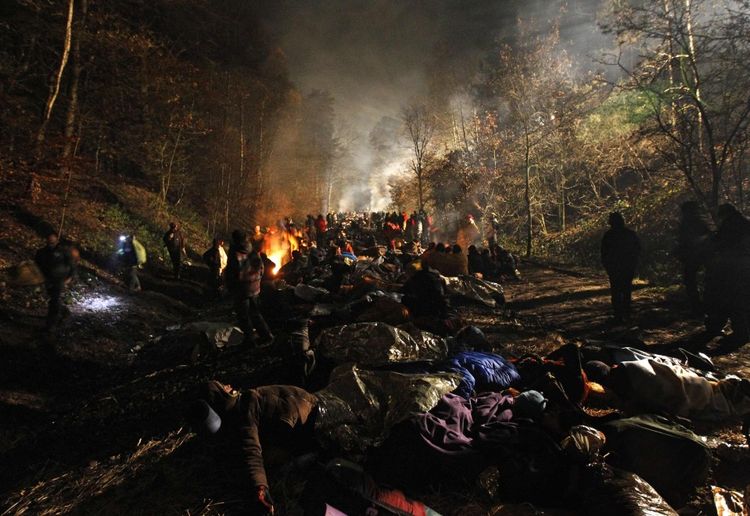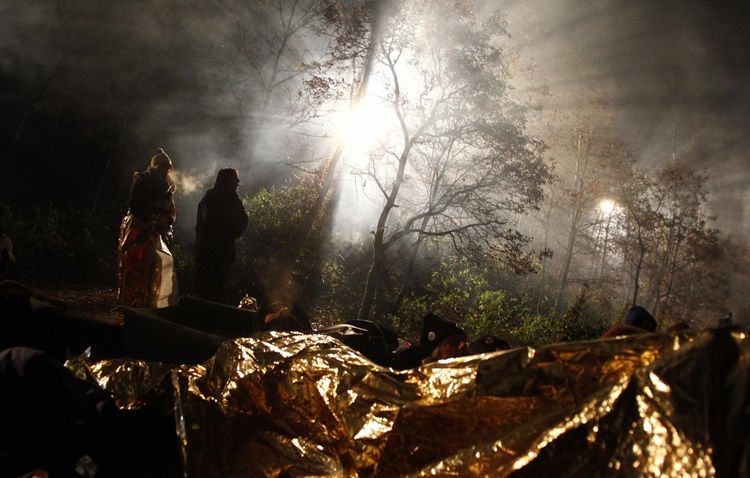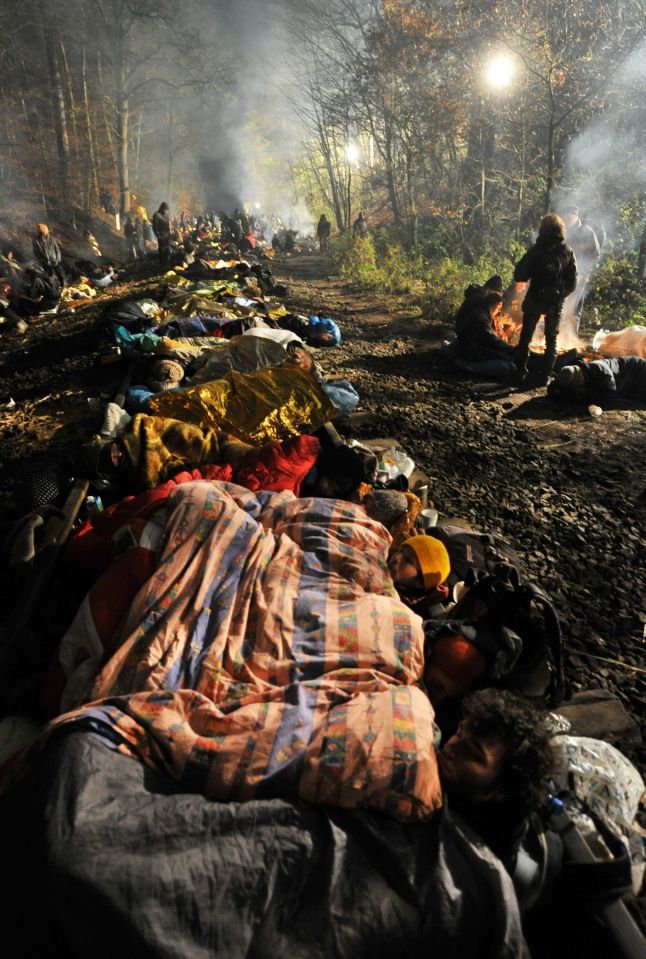Deutschland: Der Weg des Atommülls, begleitet von Protesten per Zug nach Dannenberg und dort das Umladen auf LKW.
Update um 17:19 (Schafe!)

1
Hundreds of anti-nuclear activists sit or lay on the railway tracks in Harlingen near Dannenberg November 8, 2010. German police detained about 800 protesters who refused to leave the tracks after more than 3,000 protestors blocked the tracks on Sunday disrupting a shipment of eleven Castor rail containers of reprocessed German nuclear waste to the storage dump in Gorleben.
Photo: REUTERS/Christian Charisius

2
Anti-nuclear activists sleep as they block the railway tracks in Harlingen near Dannenberg November 8, 2010. German police detained about 800 protesters who refused to leave the tracks after more than 3,000 protesters blocked the tracks on Sunday disrupting a shipment of eleven Castor rail containers of reprocessed German nuclear waste to the storage dump in Gorleben.
Photo: REUTERS/Kai Pfaffenbach

3
Mehrere tausend Atomkraftgegner sitzen am Montag (08.11.2010) im niedersächsischen Harlingen an der Fahrtstrecke des Castor-Transports, die sie 19 Stunden besetzt halten. Der zwölfte Atommülltransport aus der französischen Wiederaufbereitungsanlage La Hague fährt zur Zeit ins niedersächsische Zwischenlager in Gorleben.
Photo: Jochen Lübke dpa/lni

4
Photo: Jochen Lübke dpa/lni

5
German police walk over a field as they leave railway tracks after removing anti-nuclear activists from the tracks in Harlingen near Dannenberg November 8, 2010. German police detained about 800 protesters who refused to leave the tracks after more than 3,000 protestors blocked the tracks on Sunday disrupting a shipment of eleven Castor rail containers of reprocessed German nuclear waste to the storage dump in Gorleben.
Photo:REUTERS/Christian Charisius

6
Police officers in riot gear stand on the railway track in Harlingen, Germany, 08 November 2010. Thousands of protestors occupied the track for 19 hours. The CASTOR transport heads from the French nuclear reprocessing facility in La Hague to the interim-storage facility in Gorleben.
Photo: EPA/Jochen Lübke

7
German police line up on the railway tracks on their way to remove hundreds of anti-nuclear activists from the tracks in Harlingen near Dannenberg November 8, 2010. German police detained about 800 protesters who refused to leave the tracks after more than 3,000 protestors blocked the tracks on Sunday disrupting a shipment of eleven Castor rail containers of reprocessed German nuclear waste to the storage dump in Gorleben.
Photo:REUTERS/Christian Charisius

8
Polizeibeamte tragen am Montag (08.11.10) in der Naehe von Harlingen eine Demonstrantin weg, der zuvor aus Protest gegen den Castor-Transport ein Eisenbahngleis blockierte. Die Raeumung der Schienenblockade von etwa 3.000 Castorgegnern in Harlingen nahe Hitzacker im Wendland ist beendet. Die letzten Demonstranten wurden um kurz vor 07.00 Uhr von der Polizei weggetragen. Damit ist die Gleisstrecke fuer den Castor-Atommuelltransport zur Verladestation Dannenberg frei.
Photo: Jens Schlueter/dapd

9
Police officers in riot carry off a protestor on the railway track in Harlingen, Germany, 08 November 2010. Thousands of protestors occupied the track for 19 hours. The CASTOR transport heads from the French nuclear reprocessing facility in La Hague to the interim-storage facility in Gorleben.
Photo: EPA/Jochen Lübke

10
German riot police cut the chains used by anti-nuclear activists to block the railway tracks in Harlingen near Dannenberg November 8, 2010. German police detained about 800 protesters who refused to leave the tracks after more than 3,000 protesters blocked the tracks on Sunday disrupting a shipment of eleven Castor rail containers of reprocessed German nuclear waste to the storage dump in Gorleben.
Photo: REUTERS/Kai Pfaffenbach

11
Railway workers remove waste and check the railway tracks after an anti-nuclear protest in Harlingen near Dannenberg November 8, 2010. German police detained about 800 protesters who refused to leave the tracks after more than 3,000 protestors blocked the tracks on Sunday disrupting a shipment of eleven Castor rail containers of reprocessed German nuclear waste to the storage dump in Gorleben.
Photo: REUTERS/Christian Charisius

12
Railway workers and German police officers stand along railway tracks full of waste after police removed anti-nuclear activists from the tracks in Harlingen near Dannenberg November 8, 2010. German police detained about 800 protesters who refused to leave the tracks after more than 3,000 protestors blocked the tracks on Sunday disrupting a shipment of eleven Castor rail containers of reprocessed German nuclear waste to the storage dump in Gorleben.
Photo: REUTERS/Christian Charisius

13
Ein Atomkraftgegner hüllt sich früh am Montag (08.11.2010) im niedersächsischen Harlingen bei Minustemperaturen in eine zu dünne Decke, während er an der Fahrtstrecke des Castor-Transports sitzt, die er mit mehreren tausend Atomkraftgegner zusammen für 19 Stunden besetzt hielt. Der zwölfte Atommülltransport aus der französischen Wiederaufbereitungsanlage La Hague fährt zur Zeit ins niedersächsische Zwischenlager in Gorleben.
Photo: Jochen Lübke dpa/lni

14
Hundreds of confined anti-nuclear activists wait in a camp to be released by German riot police after being detained for blocking the railway tracks in Harlingen near Dannenberg November 8, 2010. German police detained about 800 protesters who refused to leave the tracks after more than 3,000 protesters blocked the tracks on Sunday disrupting a shipment of eleven Castor rail containers of reprocessed German nuclear waste to the storage dump in Gorleben.
Photo: REUTERS/Kai Pfaffenbach

15
Hundreds of anti nuclear protesters wake up in a temporary prison camp near Harlingen, northern Germany, Monday, Nov. 8, 2010. German police arrested the anti-nuclear activists after their rails blockade. A castor train with nuclear waste is underway from French La Hague to the nuclear interim storage plant in nearby Gorleben.
Photo:Jens Meyer/AP/dapd

16
Photo:Jens Meyer/AP/dapd

17
Anti nuclear protesters demonstrate for their freedom during a march in a temporary prison camp near Harlingen, northern Germany, Monday, Nov. 8, 2010. German police arrested the anti-nuclear activists after their rails blockade. A castor train with nuclear waste is underway from French La Hague to the nuclear interim storage plant in nearby Gorleben.
Photo:Jens Meyer/AP/dapd

18
A German police helicopter patrols along the railway track before a train with Castor containers travels along it, near Dannenberg November 8, 2010. German police detained about 800 protesters who refused to leave the tracks after more than 3,000 protestors blocked the tracks on Sunday disrupting a shipment of eleven Castor rail containers of reprocessed German nuclear waste to the storage dump in Gorleben.
Photo: REUTERS/Pawel Kopczynski

19
Eleven containers carrying nuclear waste arrive in Dannenberg, northern Germany, Monday, Nov. 8, 2010. The castor train with nuclear waste was underway from French La Hague with delay due to various protests and rail blockades of anti nuclear activists.
Photo:Michael Probst/AP/dapd

20
A train loaded with Castor containers passes German police guarding the railway track in Dannenberg November 8, 2010. German police detained about 800 protesters who refused to leave the tracks after more than 3,000 protestors blocked the tracks on Sunday disrupting a shipment of eleven Castor rail containers of reprocessed German nuclear waste to the storage dump in Gorleben.
Photo: REUTERS/Pawel Kopczynski

21
Anti-nuclear protestors show stop signals to a Castor nuclear waste container as it arrives by train at Dannenberg November 8, 2010. The controversial shipment of Castor containers with spent German nuclear fuel arrived in Dannenberg on Monday and will be loaded onto trucks before transportation to the nearby Gorleben intermediate storage facility in northern Germany after it left the French reprocessing plant of La Hague on Friday by train.
Photo: REUTERS/Fabrizio Bensch

22
Castor nuclear waste containers stand in the embarking station in Dannenberg November 8, 2010. The controversial shipment of Castor containers with spent German nuclear fuel arrived in Dannenberg on Monday and will be loaded onto trucks before transportation to the nearby Gorleben intermediate storage facility in northern Germany after it left the French reprocessing plant of La Hague on Friday by train.
Photo: REUTERS/Ralph Orlowski

23
The CASTOR arrives in Dannenberg, Germany, 08 November 2010. The CASTOR transport heads from the French nuclear reprocessing facility in La Hague to the interim-storage facility in Gorleben.
Photo: EPA/Kay Niefeld

24
A Castor nuclear waste container is loaded from a train onto a special flat bed truck at the embarking station in Dannenberg November November 8, 2010. The controversial shipment of eleven Castor containers with spent German nuclear fuel arrived in Dannenberg on Monday and will be loaded onto trucks before transportation to the nearby Gorleben intermediate storage facility in northern Germany after it left the French reprocessing plant of La Hague on Friday by train.
Photo: REUTERS/Ralph Orlowski

25
The CASTOR arrives in Dannenberg, Germany, 08 November 2010. The CASTOR transport heads from the French nuclear reprocessing facility in La Hague to the interim-storage facility in Gorleben.
Photo: EPA/Kay Niefeld

26
Anti-nuclear protesters block the main road to Germany's interim nuclear waste storage facility in the northern German village of Gorleben, November 8, 2010. The controversial shipment of Castor containers with spent German nuclear fuel arrived in Dannenberg on Monday and will be loaded onto trucks before transportation to the nearby Gorleben intermediate storage facility in northern Germany after it left the French reprocessing plant of La Hague on Friday by train.
Photo: REUTERS/Pawel Kopczynski

27
Anti-nuclear protesters in the village of Gedelitz block the road to Germany's interim nuclear waste storage facility in the northern German village of Gorleben, November 8, 2010. The controversial shipment of Castor containers with spent German nuclear fuel arrived in Dannenberg on Monday and will be loaded onto trucks before transportation to the nearby Gorleben intermediate storage facility in northern Germany after it left the French reprocessing plant of La Hague on Friday by train.
Photo: REUTERS/Pawel Kopczynski

28
Anti-nuclear protesters play table soccer at the side of the blocked road to Germany's interim nuclear waste storage facility in the northern German village of Gorleben, November 8, 2010. The controversial shipment of Castor containers with spent German nuclear fuel arrived in Dannenberg on Monday and will be loaded onto trucks before transportation to the nearby Gorleben intermediate storage facility in northern Germany after it left the French reprocessing plant of La Hague on Friday by train.
Photo: REUTERS/Pawel Kopczynski

29
Police officers in riot gear guard the CASTOR transport arriving in Dannenberg, Germany, 08 November 2010. The CASTOR transport heads from the French nuclear reprocessing facility in La Hague to the interim-storage facility in Gorleben. A train carrying 123 tons of spent nuclear fuel reached the end of its journey to Germany early 08 November under police protection after a weekend of rioting along the track.
Photo: EPA/Marcus Brandt

30
Sheep and goats are put on the road in the village of Laase, near the interim nuclear waste storage facility in the northern German village of Gorleben, November 8, 2010. The controversial shipment of Castor containers with spent German nuclear fuel arrived in Dannenberg on Monday and will be loaded onto trucks before transportation to the nearby Gorleben intermediate storage facility in northern Germany after it left the French reprocessing plant of La Hague on Friday by train.
Photo: REUTERS/Pawel Kopczynski

31
German policemen try to clear the street from sheep and goats in the village of Laase, near the interim nuclear waste storage facility in the northern German village of Gorleben, November 8, 2010. The controversial shipment of Castor containers with spent German nuclear fuel arrived in Dannenberg on Monday and will be loaded onto trucks before transportation to the nearby Gorleben intermediate storage facility in northern Germany after it left the French reprocessing plant of La Hague on Friday by train.
Photo: REUTERS/Pawel Kopczynski

32
German policemen try to clear the street from sheep and goats in the village of Laase, near the interim nuclear waste storage facility in the northern German village of Gorleben, November 8, 2010. The controversial shipment of Castor containers with spent German nuclear fuel arrived in Dannenberg on Monday and will be loaded onto trucks before transportation to the nearby Gorleben intermediate storage facility in northern Germany after it left the French reprocessing plant of La Hague on Friday by train.
Photo: REUTERS/Pawel Kopczynski

33
Security staff stand behind the gates of Germany's interim nuclear waste storage facility in the northern German village of Gorleben, November 8, 2010. The controversial shipment of Castor containers with spent German nuclear fuel arrived in Dannenberg on Monday and will be loaded onto trucks before transportation to the nearby Gorleben intermediate storage facility in northern Germany after it left the French reprocessing plant of La Hague on Friday by train.
Photo: REUTERS/Pawel Kopczynski

34
An anti-nuclear protester rests next to the blocked road to Germany's interim nuclear waste storage facility in the northern German village of Gorleben, November 8, 2010. The controversial shipment of Castor containers with spent German nuclear fuel arrived in Dannenberg on Monday and will be loaded onto trucks before transportation to the nearby Gorleben intermediate storage facility in northern Germany after it left the French reprocessing plant of La Hague on Friday by train.
Photo: REUTERS/Fabrizio Bensch